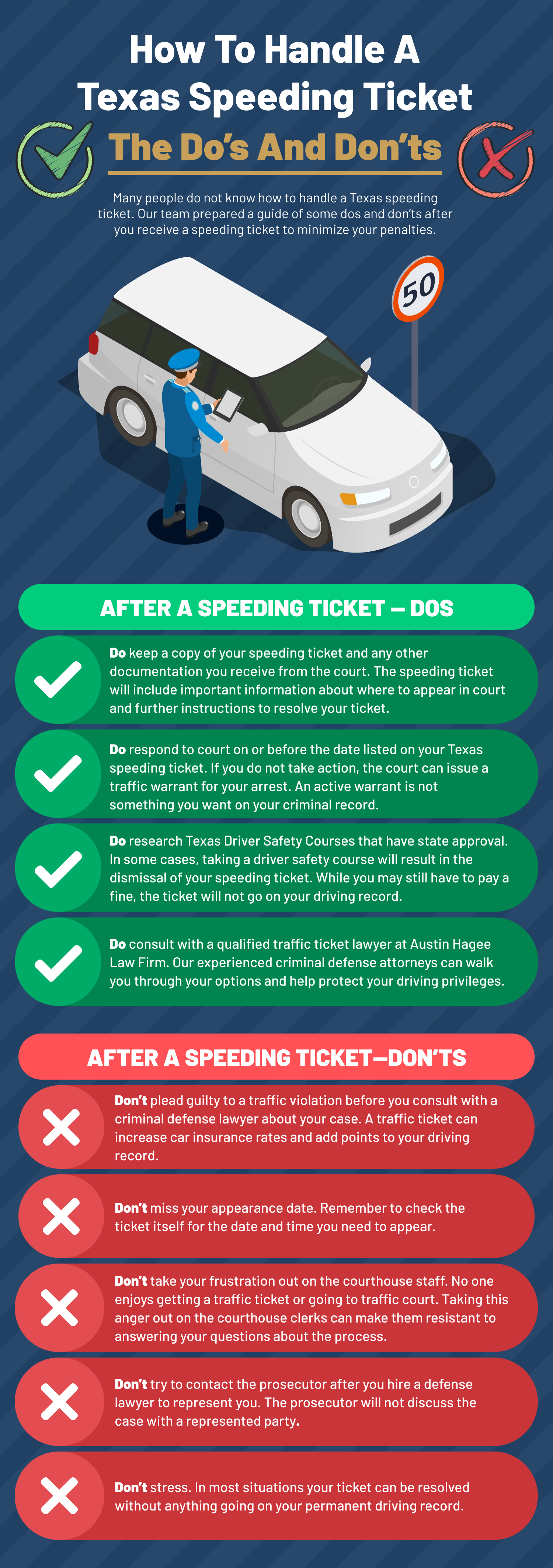

Speeding tickets are among the most common traffic violations in Texas, and they can have a significant impact on your driving record, insurance rates, and finances.
If you find yourself issued a speeding ticket in Texas, it is crucial to understand your options and take appropriate action to safeguard your driving privileges.
Below, the San Antonio criminal defense attorneys at Austin Hagee Law Firm go over what you should know when you are issued a speeding ticket in Texas.
If you have questions, please contact us online or call 210-934-9768.
Contents hideIn Texas, the state’s speeding laws dictate specific default speed limits for different road types. Rural highways have a default limit of 70 mph, whereas urban highways are set at 60 mph. Within urban areas, the default speed limit is 30 mph, and certain areas like beach areas and alleys have even lower limits at 15 mph. It’s important to note that exceeding 85 mph on Texas roads is against the law, regardless of some drivers’ perceptions.
In Texas, speeding constitutes a Class C misdemeanor, leading to a maximum fine of $500. Persistent violations may result in complications related to driver’s license and insurance for motorists in the state.
Felony speeding in Texas occurs when a driver exceeds 25 miles per hour over the speed limit and attempts to evade law enforcement. This offense can result in severe consequences, including hefty fines and lengthy incarceration. Immediate consultation with a skilled criminal defense attorney is crucial in such cases.
Tiered Speed Limit Fines
In Texas, the consequences of a speeding ticket vary based on the severity of the offense. Speeding tickets are categorized into three classes:
Class C Misdemeanor is the least severe category and is usually given for speeds below 10 miles per hour over the posted speed limit. These tickets typically result in fines and points on your driving record, but they do not carry the risk of jail time.
On the other hand, Class B and Class A Misdemeanor speeding tickets are more serious and can lead to fines, points on your driving record, and, in some cases, even jail time.
These tickets are commonly issued for speeds exceeding 25 miles per hour over the posted speed limit or for reckless driving.
Another consequence of speeding tickets in Texas is the potential requirement to attend defensive driving courses. Depending on the severity of the offense and your driving record, the court may mandate that you complete a defensive driving course.
These courses aim to improve your driving skills and increase awareness of safe driving practices. Successfully completing the course can sometimes lead to the reduction of fines or points on your driving record.
It’s essential to comply with any court-ordered requirements promptly to fulfill your obligations and demonstrate a commitment to safer driving.
It’s worth noting that speeding tickets can have repercussions beyond fines and points on your record. Certain professions, such as commercial truck drivers or individuals with jobs that require a clean driving record, may face additional consequences due to a speeding ticket.
Losing employment opportunities or facing limitations in job prospects can be a significant concern. Seeking legal advice from a traffic ticket attorney can help assess the potential impact on your specific situation and explore options for minimizing the consequences on your professional life.
Understanding the impact of speeding tickets on your insurance rates is crucial. Insurance companies typically consider traffic violations, including speeding tickets, when determining your premium rates.
Multiple speeding tickets or a history of traffic violations can result in higher insurance premiums. It’s important to be aware of this financial aspect and take steps to mitigate the impact on your insurance rates.
Working with an experienced traffic ticket attorney can help you explore options to potentially reduce or dismiss the charges, which can positively influence your insurance premiums in the long run.
When faced with a speeding ticket in Texas, you have several options for dealing with it. You can opt to pay the fine, which will result in points on your driving record. Alternatively, you can contest the ticket in court.
If you decide to contest the ticket, it is essential to collaborate with an experienced traffic ticket attorney. They can review the evidence against you, challenge the charges, and fight for a reduction or dismissal of the ticket.
It’s important to note that each speeding ticket case is unique, and various factors can influence the outcome. These factors can include the specific circumstances surrounding the offense, the available evidence, and even the court jurisdiction.
Working with a skilled traffic ticket attorney who understands the nuances of Texas traffic laws and has experience navigating the local court systems can greatly enhance your chances of achieving a favorable outcome.
Their expertise can help you develop a tailored defense strategy, present compelling arguments, and negotiate potential reductions or dismissals of the charges.

At the Austin Hagee Law Firm, we possess extensive experience representing clients in Texas traffic ticket cases, including speeding tickets.
We understand the potential consequences of a speeding ticket and will tirelessly work to protect your driving privileges. To speak with one of our defense lawyers, please contact us online or call 210-934-9768.

Austin M. Hagee is a trusted and proven San Antonio trial lawyer who tirelessly defends his clients’ constitutional rights. As a former prosecutor turned nationally recognized criminal defense attorney, Austin has the knowledge and expertise to get the best possible outcome for his clients.